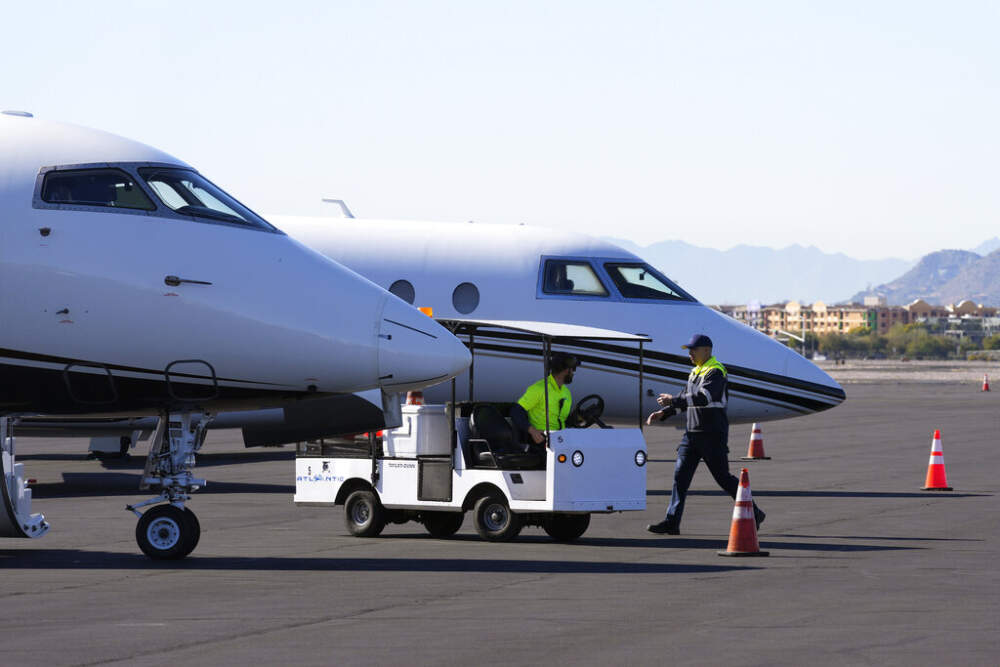Advertisement
Commentary
Private jets are a climate disaster. Hanscom shouldn’t allow more

The developers of Hanscom Field are proposing a massive expansion, enlarging the airport by more than a half-million square feet and creating 27 new hangars. With even just three jets per hangar, this would mean capacity for up to 81 additional private jets. It would require cutting down acres of mature trees — the kind that sequester the most carbon.
The airfield lies near the Great Meadows National Wildlife Refuge, Walden Pond and many other beloved historical sites. This immense expansion of private jet capacity has the potential to single-handedly negate the total combined greenhouse gas reductions that Massachusetts and our cities and towns are working so hard to achieve.
Nothing spells climate injustice like private jets. A typical private jet with only four or five customers on board emits four times as much carbon dioxide equivalent in 2 1/2 hours as an average gas-powered car in an entire year. Although you pay taxes on your car, private jet owners are exempt from taxes, even as they use tax-payer-funded airports, air traffic control and hangars to store their jets.
Private jet owners tend to be the wealthiest of the wealthy. They have an average net worth of $190 million (for individual owners) and are overwhelmingly over 50 and male. And despite an increasingly dire climate reality, private jet travel is growing by leaps and bounds, as are the resulting emissions.
Nothing spells climate injustice like private jets.
To be sure, flying commercially had lost much of its glamour long before the pandemic made sitting on a packed commercial jet outright dangerous. Airlines have eliminated perks like free drinks and food, videos and checked luggage on domestic flights and flyers may endure endless lines and humiliating intrusion of privacy at security checkpoints, as well as the disturbing increase of aggression among passengers. And after thousands of passengers got stranded last December, thanks to outdated airline software, many no doubt wished they could afford to take private jets instead.
But of course, that would lead to climate disaster.
In its “Confronting Carbon Inequality” report, Oxfam and the Stockholm Environment Institute found already in 2020 that from 1990 to 2015 the “wealthiest 1% of the world’s population was responsible for the emission of more than twice as much carbon dioxide as the [entire] poorer half of the world.” Although women reportedly have more wealth today than ever before, only 15% of ultrahigh-net-worth individuals are women. And even if some private jets are owned by corporations or rented out by the hour, it's also true that some of the main perpetrators of climate change worldwide are uber-wealthy men.
The growth of private jets suggests that these wealthy and mostly older men (Warren Buffet famously among them) are oblivious to the raging climate crisis.
A green light for Hanscom’s expansion would send a dangerous signal to private jet hangar developers all across the country.
The Norwood-based developers who proposed building the hangars, North Airfield Ventures and Runway Realty Ventures, contended that the new hangars will be "climate-friendly.” But nobody should be blinded by the developers’ promise of hangars designed “with clean and efficient energy” as though a private jet airport were less of an injustice when built sustainably. The suggestion to allow the expansion to move forward for fossil-fuel-free electric planes only, as floated by state Sen. Michael Barrett, is highly problematic as well, given that the planes would be using up precious rare minerals for the benefit of a few ultra-rich.
On Gov. Maura Healey's first day in office in January, she named Melissa Hoffer the state's first-ever climate chief, calling the climate crisis “Massachusetts’ greatest challenge.” Healey's administration intends to increase offshore wind and she has made other promises supporting more rapid decarbonization. Expanding private jet travel flies in the face of these ambitions. So far, Rebecca Tepper, Healey’s secretary of environment, has shown that she is a good listener. She took note of the historic number of comments received (350) during the comment period in February in her response to the developers and demanded numerous tests and in-depth studies.
Now Massachusetts' climate activists must get organized. A green light for Hanscom’s expansion would send a dangerous signal to private jet hangar developers all across the country. Massachusetts must send a climate signal instead — a signal like those coming from Europe: France has successfully banned domestic short-haul flights and is planning to impose a 70% “supertax” on fuel as a first step towards reducing private jet travel.
Schiphol Airport near Amsterdam, the largest airport in the Netherlands, is considering banning private jets completely in order to lower emissions in line with Paris Agreement commitments. In Massachusetts, for starters, we should all sign the online petition and demand that Healey put a stop to this injustice perpetrated by a tiny minority of super-rich on all the rest of us.
